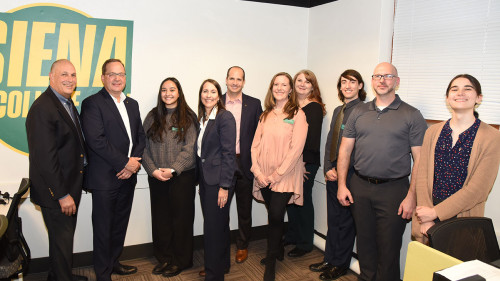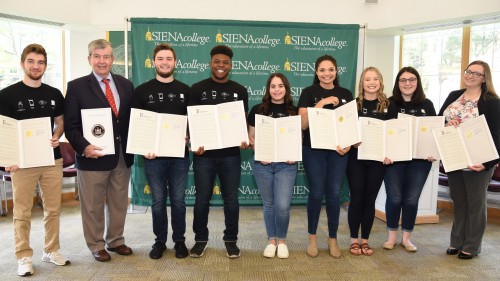
The Siena College Research Institute (SCRI) is known internationally for the accuracy and impact of its election polling, particularly the Upshot polling they conduct with the New York Times.
With the 2024 election season on the horizon, they hosted their partners from the Times to explore “Using Polling to Understand the 2024 Elections.” The September 22 panel featured SCRI Director Don Levy, Ph.D., as well as Nate Cohn, the Times’ chief political analyst; staff editor Ruth Igielnik; and Will Davis, director of election analytics. Daniel Solis ’24 was the moderator.
With data-driven journalism on the rise, the panel discussed how data is used to tell compelling stories in the world of elections and polling. Cohn said that when looking for a partner for their polling operation, SCRI “was the obvious choice” because of their accuracy. (SCRI was the only pollster to call Florida for Donald Trump in 2016.)
Levy said that when the partnership was launched, they were seen as “disrupters and innovators” for their methodology, and that they “have changed the way polling is done now.”
“This partnership has made a major contribution to the polling landscape,” he said.
The panel closely examined the methodology they use to poll likely voters, how questions are formulated and how samples are selected. While most major polling operations report results with a broadcast outlet, SCRI and the Times are noted for the depth of their print and online coverage.
“It takes a tremendous amount of resources to do this level of polling,” said Davis. “Our readership cares very deeply about political issues and we develop the polling with that in mind.”
When crafting questions, Igielnik explained that the team determines the general ideas they want to capture, and what they want to understand about the way the public thinks.
“Polling is basically a snapshot in time,” she said. “We’re always looking at trends. When we create the polls, we’re constantly going back and forth to tweak wording and do cognitive testing.”
Cohn, who said he is proud of how their joint polling “impacts how people participate in a democratic system,” did a quick poll of his own: asking Siena students in the audience their majors, which ranged from communications to history to political science.
“You can succeed whatever your major,” he said when talking about possible careers for those interested in these topics. “Learn about yourself and your skills and find out what differentiates you from your competition.”
Solis, a political science/economics double major, has been working for SCRI as a caller since his freshman year, and interned with them over the summer. He was selected to moderate the panel.
“It was a great experience,” he said. “I had met Nate Cohn previously at a conference and he remembered me. It was very much an honor to be asked to moderate, and I was comfortable doing it given the work I have done for SCRI.”
Solis plans to pursue a doctorate and enter the academic world after graduating from Siena
Travis Brodbeck, associate director of data management for SCRI, helped to organize the panel. He said the purpose of the event was twofold:
First, we wanted to give our students an opportunity to hear from and meet with world-renowned journalists who cover the political elections,” he said. “Second, we also wanted to highlight the amazing partnership that the Siena College Research Institute and the New York Times have together.”
Brodbeck said the partnership was established in early 2012, but truly blossomed during the 2016 election and has been going strong ever since. After the panel, SCRI and the Times editors had an in-person strategic planning session and a tour of the newly-renovated call center in Hines Hall with calls in progress.
“One of our journalists got on the phone and started dialing with alongside our interviewers,” said. “We were able to make a lot of plans for this October's polls and the polls in the coming year, all way up to Election Day 2024.”

